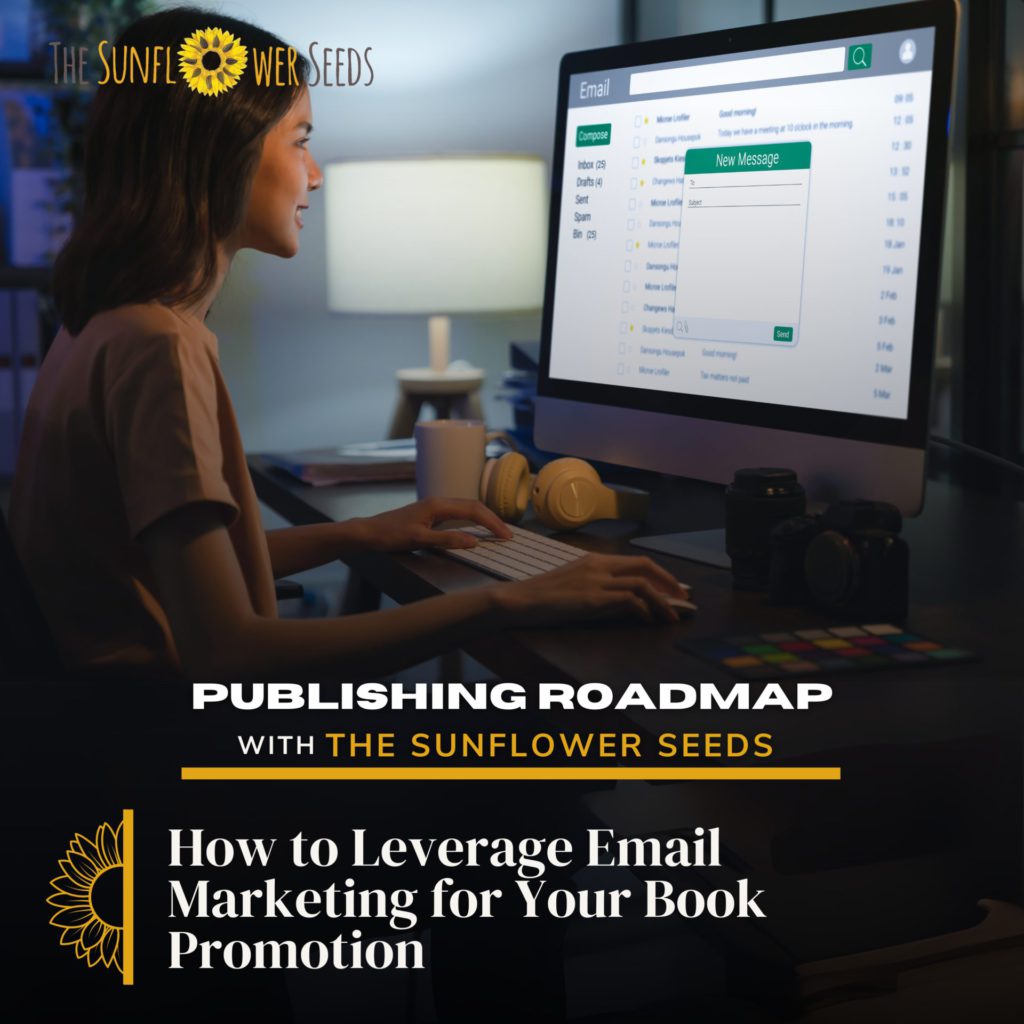How to Leverage Email Marketing for Your Book Promotion
“Email has an ability many channels don’t; creating valuable personal touches – at scale.“
— David Newman

Email marketing is one of the most powerful tools for book promotion. While social media and paid ads can generate short-term buzz, email marketing helps you build a long-term relationship with your readers. Many authors struggle with questions like “How do I build an email list for book promotion?”, “What is the best email marketing strategy for authors?”, or “How do I write engaging emails that sell books?”. In this guide, we’ll explore how email marketing can help authors reach more readers, increase book sales, and create a loyal fan base.
At The Sunflower Seeds, we work closely with authors to develop email marketing strategies that effectively promote books, drive engagement, and boost conversions. Whether you’re a self-published author looking to grow your audience or a traditionally published writer trying to increase book visibility, this guide will help you unlock the potential of email marketing.
Why Is Email Marketing Important for Book Promotion?
Many authors focus heavily on social media marketing, but email marketing offers a direct and personal way to communicate with readers. Unlike social media platforms where algorithms limit post reach, emails land directly in a reader’s inbox, ensuring they see your content. Email marketing also has one of the highest return-on-investment (ROI) rates, making it a cost-effective book marketing strategy.
One of the key benefits of email marketing is the ability to build a targeted audience. Unlike social media followers who might scroll past your content, email subscribers have actively signed up to hear from you, meaning they are genuinely interested in your work. This makes them more likely to engage with your emails, pre-order books, leave reviews, and recommend your work to others.
Additionally, email marketing allows authors to segment their audience. You can create different email lists for new subscribers, long-time fans, or readers who have purchased your previous books. This ensures that each email is tailored to the right audience, increasing open rates and engagement.
At The Sunflower Seeds, we help authors develop personalized email marketing campaigns that keep readers engaged and excited about upcoming book releases.
How to Build an Email List for Your Book Promotion?
One of the biggest challenges for authors is growing an email list. Readers don’t sign up for newsletters without a good reason, so offering valuable incentives is key. A lead magnet—such as a free eBook, an exclusive short story, or early access to a book chapter—encourages readers to subscribe. If you’ve been wondering “How do I drive traffic to my author email list?”, offering a compelling freebie is one of the best ways to attract subscribers.
Another great strategy is to add a newsletter signup form to your author website, blog, and social media pages. Platforms like Instagram, Facebook, and Twitter allow authors to promote newsletter signups with a simple call-to-action. If you already have a blog, you can optimize it for conversions by including email signup forms in blog posts about writing tips, book reviews, or behind-the-scenes author insights.
Additionally, hosting giveaways and contests can help authors grow their email lists. For example, running a book giveaway campaign and asking participants to subscribe to your email list in exchange for a chance to win a signed copy of your book is an effective way to get more subscribers.
At The Sunflower Seeds, we specialize in helping authors create high-converting lead magnets and grow their email lists using proven strategies that attract engaged readers.
What Should You Include in Your Author Emails?
The success of an email marketing campaign depends on the quality of your emails. Many authors make the mistake of only sending promotional emails, which can lead to low engagement and high unsubscribe rates. Instead, the best email marketing strategies for authors focus on providing value, storytelling, and connection.
Your author emails should include:
- Engaging Subject Lines: The subject line is the first thing readers see, so it needs to be compelling. Phrases like “Exclusive Sneak Peek: Read the First Chapter of My New Book” or “Behind-the-Scenes: How I Created My Latest Novel” make readers want to open your email.
- Personalized Content: Address readers by their first name and write in a conversational tone. Share personal anecdotes about your writing journey, inspiration, or the struggles of being an author. Readers love to connect with authors on a personal level.
- Exclusive Content: Offer something valuable in every email—whether it’s a bonus scene, an author Q&A, writing tips, or a discount on your book.
- Clear Call-to-Action (CTA): Every email should have a goal—whether it’s asking readers to buy your book, leave a review, or share your newsletter. Make your CTA clear and persuasive.
At The Sunflower Seeds, we help authors craft engaging email sequences that keep readers excited, leading to higher engagement and book sales.
How to Use Email Marketing to Sell More Books?
One of the most common questions authors ask is “How do I use email marketing to increase book sales?”. The key is to build anticipation before your book launch and keep your subscribers engaged throughout your writing journey.
A pre-launch email sequence can build excitement before your book release. Start by announcing your book months in advance, giving readers behind-the-scenes insights into the writing process, cover reveals, and early teaser chapters. This ensures that when your book is finally available, your audience is ready to buy.
Additionally, offering limited-time discounts and pre-order bonuses can encourage more sales. Sending an email with a special early-bird discount or an exclusive signed bookplate for pre-orders can make readers more likely to purchase your book right away.
If you’re launching your book in highly competitive book markets like Mumbai, Delhi, and Jaipur, using email marketing to coordinate local book signings, online events, and launch parties can help generate buzz and increase visibility.
At The Sunflower Seeds, we create high-converting email campaigns designed to help authors maximize book sales and grow a loyal readership.
How to Automate Your Email Marketing for Better Engagement?
Many authors worry that email marketing is too time-consuming, but automation makes it easier to stay consistent. Using platforms like Mailchimp, ConvertKit, and MailerLite, authors can set up automated email sequences that send emails at specific times without manual effort.
For example, a welcome email series can introduce new subscribers to your books, offer them a free sample, and encourage them to follow you on social media. A follow-up email after a book launch can remind readers to leave reviews, which is crucial for increasing book credibility.
Automated emails can also be used to re-engage inactive subscribers, ensuring that your email list remains active and responsive.
At The Sunflower Seeds, we help authors implement email automation strategies that save time while keeping readers engaged.
Conclusion: Why Every Author Needs an Email Marketing Strategy
Email marketing is one of the most effective ways to promote your book, connect with readers, and grow your author brand. Unlike social media, where posts can get lost in the algorithm, emails reach your audience directly, making them an invaluable marketing tool.
By building an engaged email list, crafting compelling content, and automating your campaigns, you can increase book sales, strengthen reader loyalty, and establish yourself as a successful author. Whether you’re a first-time writer or a seasoned author, email marketing is essential for long-term success.
At The Sunflower Seeds, we help authors create customized email marketing strategies that drive real results. If you’re ready to leverage email marketing to boost book sales, contact us today!
Discover The Best Tools for Writing and Organizing Your Book, from top writing software to editing, formatting, and productivity apps.





